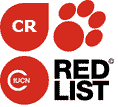| Types | Holotype: KU 219924 (Museum of Natural History, University of Kansas), adult male from El Cusuco (15°31‘N, 88°12’W), a finca located 5.6 km WSW Buenos Aires, 1550 m elevation, Sierra de Omoa, Depar- tamento de Cortes, Honduras (Fig. 4), col- lected 22 May 1980 by James R. McCranie and Larry David Wilson. Paratypes. KU 219925-30, all adult males, KU 219931-36, all subadult males, KU 219937-47, all adult females, KU 219948-49, all subadult females, all from the type locality, 1530-1720 m elevation. |
| References |
- Brown, Tom W.; John David Curlis, George Lonsdale, Cameron Thorpe, and Alexander Hoad 2018. Color change in the gorgetal scales of an anole, Anolis amplisquamosus (Squamata: Dactyloidae). IRCF Reptiles & Amphibians 25 (2): 127–128 - get paper here
- Hofmann, E. P., & Townsend, J. H. 2017. Origins and biogeography of the Anolis crassulus subgroup (Squamata: Dactyloidae) in the highlands of Nuclear Central America. BMC Evolutionary Biology, 17(1), 267 - get paper here
- Hofmann, E.P., Townsend, J.H. 2020. Origins and biogeography of the Anolis crassulus subgroup (Squamata: Dactyloidae) in the highlands of Nuclear Central America. BMC Evol Biol 17, 267 (2017) - get paper here
- Köhler, G. 2000. Reptilien und Amphibien Mittelamerikas, Bd 1: Krokodile, Schildkröten, Echsen. Herpeton Verlag, Offenbach, 158 pp.
- Köhler, G. 2008. Reptiles of Central America. 2nd Ed. Herpeton-Verlag, 400 pp.
- KÖHLER, GUNTHER 2014. Characters of external morphology used in Anolis taxonomy—Definition of terms, advice on usage, and illustrated examples. Zootaxa 3774 (2): 201–257 - get paper here
- Laking AE, Solís JM, Brown T, Maddock ST, Burdekin O, Taylor P, Lonsdale G, Green SEW, Martin TE, Galdamez JR, Kolby JE, Erens J, Jocque M 2024. The amphibians and reptiles of Cusuco National Park, Northwest Honduras: updates from a long-term conservation programme. In: Lipińska M, Lopez-Selva MM, Sierra JM (Eds) Biodiversity research in Central America. Neotropical Biology and Conservation 19(2): 37-62 - get paper here
- McCranie J R; Wilson L D; Williams K L 1992. A new species of anole of the Norops crassulus group (Sauria: Polychridae) from northwestern Honduras. Carib. J. Sci. 28 (3-4): 208-215
- McCranie, James R. 2015. A checklist of the amphibians and reptiles of Honduras, with additions, comments on taxonomy, some recent taxonomic decisions, and areas of further studies needed. Zootaxa 3931 (3): 352–386 - get paper here
- McCranie, James R. 2018. The Lizards, Crocodiles, and Turtles of Honduras. Systematics, Distribution, and Conservation. Bulletin of the Museum of Comparative Zoology, Special Publication Series (2): 1- 666 - get paper here
- McCranie, James R. and Gunther Köhler 2015. The Anoles (Reptilia: Squamata: Dactyloidae: Anolis: Norops) of Honduras. Systematics, Distribution, and Conservation. Bull. Mus. Comp. Zool. Harvard (Special Publication Series, No. 1): 1-280 [review in Q. J. Biol. 91: 227] - get paper here
- Meiri, Shai; Aaron M. Bauer, Allen Allison, Fernando Castro-Herrera, Laurent Chirio, Guarino Colli, Indraneil Das, Tiffany M. Doan, Frank Glaw, Lee L. Grismer, Marinus Hoogmoed, Fred Kraus, Matthew LeBreton, Danny Meirte, Zoltán T. Nagy, Cristiano d 2017. Extinct, obscure or imaginary: the lizard species with the smallest ranges. Diversity and Distributions 24 (2): 262-273 - get paper here
- Nicholson, K.E. 2002. Phylogenetic analysis and a test of the current infrageneric classification of Norops (beta Anolis). Herpetological Monographs 16: 93-120 - get paper here
- NICHOLSON, KIRSTEN E.; BRIAN I. CROTHER, CRAIG GUYER & JAY M. SAVAGE 2018. Translating a clade based classification into one that is valid under the international code of zoological nomenclature: the case of the lizards of the family Dactyloidae (Order Squamata). Zootaxa 4461 (4): 573–586 - get paper here
- Poe, S. 2013. 1986 Redux: New genera of anoles (Squamata: Dactyloidae) are unwarranted. Zootaxa 3626 (2): 295–299 - get paper here
- Poe, Steven 2025. A Guide to the Anolis Lizards (Anoles) of Mainland Central and South America. Princeton University Press, 432 pp. - get paper here
- Solís, J. M., L. D. Wilson, and J. H. Townsend. 2014. An updated list of the amphibians and reptiles of Honduras, with comments on their nomenclature. Mesoamerican Herpetology 1: 123–144 - get paper here
- Townsend, Josiah H.; Larry David Wilson 2009. New Species of Cloud Forest Anolis (Squamata: Polychrotidae) in the crassulus Group from Parque Nacional Montaña de Yoro, Honduras. Copeia, 2009 (1): 62-70 - get paper here
- Wilson, L.D. & McCranie, J.R. 2003. The herpetofauna of the cloud forests of Honduras. Amphibian & Reptile Conservation 3 (1): 34-48 - get paper here
|
![]()


